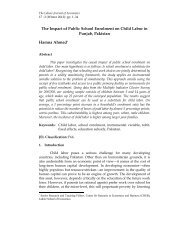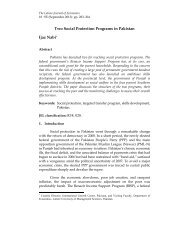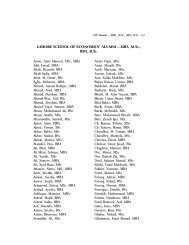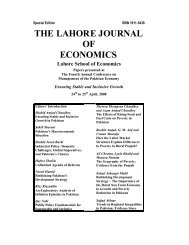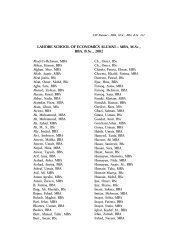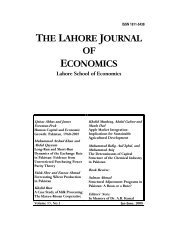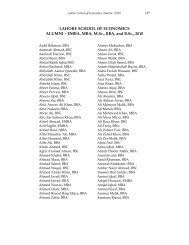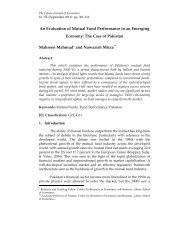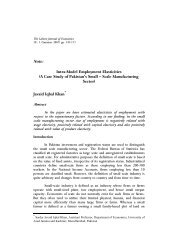Special Edition-07.pdf - Lahore School of Economics
Special Edition-07.pdf - Lahore School of Economics
Special Edition-07.pdf - Lahore School of Economics
Create successful ePaper yourself
Turn your PDF publications into a flip-book with our unique Google optimized e-Paper software.
Monetary, Fiscal and Financial Sector Policies: Shahid Kardar evaluated Pakistan’s<br />
recent performance in monetary and fiscal management <strong>of</strong> the economy. While<br />
admitting that macroeconomic stability has been maintained, he argued that the<br />
situation remains precarious, given the level <strong>of</strong> inflation, current account deficit,<br />
and fiscal deficit. The economy has benefited from inflows from donors post-9/11,<br />
increased remittances <strong>of</strong> overseas Pakistanis, and privatization receipts, but the<br />
country may not be able to rely on these sources indefinitely. More recently, the<br />
government tightened monetary policy. Mr. Kardar also looked at the fiscal<br />
policies <strong>of</strong> the government. The government had been financing expenditures<br />
through borrowing from the State Bank, but changes were needed in order to<br />
reduce the inflationary pressures that this borrowing had created. With this view,<br />
the article presented suggestions for reforming both government expenditures and<br />
revenues.<br />
Shakil Faruqi began with a summary <strong>of</strong> the financial reform efforts that began in<br />
Pakistan in the early 1990s, in particular the privatization and consolidation <strong>of</strong> the<br />
banking sector. He assessed the current state <strong>of</strong> the banking system with regards<br />
to soundness, non-performing loans, intermediation costs and efficiency (spreads),<br />
pr<strong>of</strong>itability, banking and exchange rate risks, and sensitivity to shocks. Despite an<br />
impressive performance in several areas, he noted that shortcomings remain; among<br />
these is lack <strong>of</strong> credit access for large segments <strong>of</strong> the population, and lagging<br />
levels <strong>of</strong> financial intermediation as compared to other countries at similar stages <strong>of</strong><br />
development.<br />
Muhammad Arshad Khan and Sajawal Khan also looked at financial sector reforms.<br />
The paper begins with a framework for the three major stages <strong>of</strong> financial sector<br />
reform. They divided Pakistan’s past reform efforts into three phases, starting in<br />
the late 1980s. They evaluated the effects <strong>of</strong> these sustained reform efforts by<br />
looking at the impacts on interest rates, bank solvency, credit and indicators <strong>of</strong><br />
financial deepening, bank pr<strong>of</strong>itability, privatization, and corporate governance.<br />
Suggestions for a second generation <strong>of</strong> reforms were given, including a focus on<br />
macro-stability, governance, institutional capacity building and property rights,<br />
development <strong>of</strong> venture capital and private equity, and the legal infrastructure for<br />
finance.<br />
Exchange Rate and Trade Policies: M. Ashraf Janjua analyzed trends in Pakistan’s<br />
real exchange rate (REER) over the period 1978 to the present, and identified the<br />
domestic policies and events in the external environment that contributed to REER<br />
movements. The article also included an econometric analysis <strong>of</strong> the equilibrium<br />
real exchange rate (ERER), based on macroeconomic fundamentals. The estimated<br />
equilibrium real exchange rate was then compared to the actual REER to identify<br />
exchange rate misalignments over the last three decades.<br />
Naheed Zia Khan turned the discussion to international trade, by providing a<br />
detailed overview <strong>of</strong> the history <strong>of</strong> trade negotiations through GATT and the WTO.<br />
Given the current (stalled) round <strong>of</strong> trade negotiations in Doha, she paid particular<br />
attention to the issue <strong>of</strong> agriculture, focusing on Pakistan’s modest support policies<br />
toward agriculture and contrasting them with the strong agricultural support<br />
<strong>of</strong>fered by the US, EU and other developed nations.<br />
Samina Shabir and Reema Kazmi gave a detailed account <strong>of</strong> the history <strong>of</strong> economic<br />
cooperation between Pakistan and China, describing the many agreements signed



